Opinion: Off the field, off the court: mental health and student athletes
It’s a shame that society has stigmatized mental illness, especially in the world of sports.
The grim events that have transpired this year have inclined many athletes to take better care of their mental health. Alas, in fear of being viewed as lazy, incapable, or weak, mental illness is often cast aside or hidden. In reality, 1 in 4 adults have experienced a mental illness at one point in their life, and athletes are certainly no exception.
In May, over 3,000 high school athletes were surveyed by researchers from the University of Wisconsin and found that, due to Covid-19 and sports cancellation, 35% had moderate-to-severe depression, and 25% had moderate-to-severe anxiety.
While the University researchers limited the respondents to high school athletes, the rise in depression has been a serious issue for college athletes as well. An NCAA survey from April revealed that of the 37,000 college athletes who reported their mental status, 1 in 10 felt so depressed that it was difficult to function.
In college, student-athletes are more or less the ‘campus celebrities’ that are expected to constantly perform at an elite level. They often fight their own personal battles in silence, as there’s simply no time to focus on mental health.
I’m inspired by Victoria Garrick, a former Division I volleyball player and mental health advocate. Victoria explains how she was able to manage her mental health and emphasizes the importance of destigmatizing mental illness in an incredible TedTalk from 2017. She equates society’s treatment of mental health today to society’s treatment of concussions twenty years ago. It wasn’t until 2009 that the NFL publicly acknowledged that concussions can have long-lasting effects on players.
“Twenty years ago, nobody cared about concussions,” she exclaims. “Players were told to ‘tough it out’ if your head hurts… the way we treat mental illness today is so similar to the way we treated concussions twenty years ago. Oh, this athlete feels depressed? Sleep it off. Oh, that athlete’s having an anxiety attack? Tell them to calm down… right now, a physical injury is treated more seriously than a psychological injury, and that needs to change.”
I can only imagine the stress student-athletes have been under the last few months. When an athlete’s life revolves around the sport they play, there’s no question that they’ll lose sleep, unsure if the coronavirus will allow them to play another game or even compete as a team at all.
Not long ago I had an enlightening conversation with Riley Jensen, recently named mental performance coach at Utah State. He works with athletes to increase confidence and decrease their anxiety or nerves going into a competition. Countless athletes have realized their potential as a result of Jensen’s expertise regarding the psychology of mental performance, and I wanted to better understand how athletes are handling the difficulties that have arisen as a result of the pandemic.
“The difficult thing about COVID-19 is fear of the unknown,” Jensen explains. “But, nothing is really known. I think we have educated guesses as to what the future looks like. So, helping people focus on the present, helping people focus on what they can do right here, right now, is a really important step towards confidence, towards happiness, and towards performance. That’s where I’m trying to lead the athletes and people that I work with— to try to get them to the present moment.”
That message can be applied to everyone, not just athletes. Dwelling on things out of our control never solves anything. It’s easy to stress about the future, but the fastest path to high performance is an absolute focus on the task at hand. Of course, that is not to say that one can simply choose to overcome anxiety and depression overnight. But adhering to Jensen’s insights unquestionably encourages a healthy state of mind.
Jensen continues, “So much is not in our control. Whether Utah State plays a game with fans or without fans, whether we even get to play a game or not, these are all things that are out of our circle of control. But we can control our attitude. We can control our effort. We can control our preparation. And most importantly, we can control our reaction and response to things. I think a really important principle in sports psychology is that in-between events that happen to us and the way that we respond, there’s a choice. Choose wisely your reaction to things, as that will make a huge difference in the outcomes that take place.”
The amount of time and dedication required to be a student-athlete along with the intense pressure to perform well is a weight carried by all athletes behind closed doors. Mental illness is certainly not a sign of weakness. Even the world’s greatest athletes have fought through their own mental battles. Michael Phelps, the most decorated Olympian of all time, has intermittent depression. Tennis star Serena Williams struggles with major depression, NBA player Kevin Love opened up about his severe anxiety in a tweet from 2018, and the list goes on and on.
Downplaying mental health is dangerous. Mental illness is real, and it is becoming more of a problem every day. Student-athletes should feel no shame in reaching out for help if they need it. Everyone is human, and everyone encounters unique challenges that are sometimes difficult to overcome alone.
It’s comforting to know that progress is being made. Studies have shown that there has been a significant decrease in the stigma of mental health over the past few years. Utah State is continuing to expand CAPS (Counseling and Psychological Services) as well as ensuring that mental wellness resources are readily available for students at all times. People are becoming more aware of the severity of the issue, and perhaps one-day mental health will not be stigmatized at all.

Brayden Rigby is a sophomore studying Journalism. He enjoys writing of any kind, and spends most of his free time running and swimming.
brayden.rigby@usu.edu

